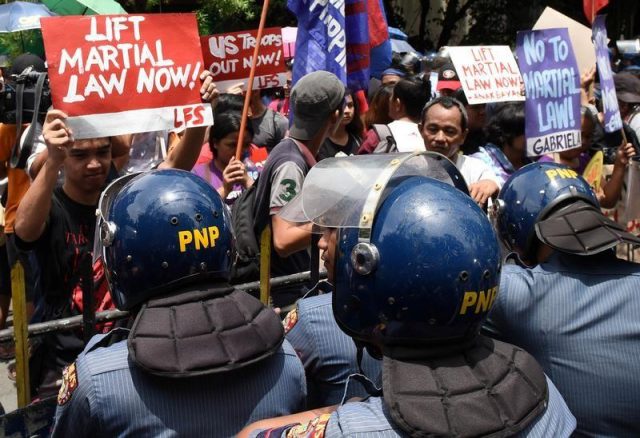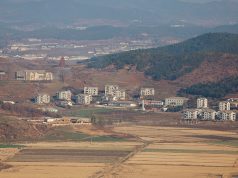
MANILA, Philippines — The petitioners questioning before the Supreme Court the constitutionality of the yearlong extension of martial law in Mindanao are asking the tribunal to disregard its own ruling on the validity of Proclamation No. 216 issued by President Rodrigo Duterte last May.
In his comment in response to the four petitions filed against the extension of martial law, Solicitor General Jose Calida said the petitioners are also asking the high court to reverse its earlier decision that rebellion in Mindanao, the basis for declaring martial law, exists throughout the island “not just in Marawi.”
The tribunal has consolidated the petitions against the extension of martial law and scheduled oral arguments for January 16 and 17.
The Supreme Court had earlier upheld Duterte’s proclamation of martial law for 60 days over Mindanao last May 23, soon after fighting broke out between government forces and extremist gunmen in Marawi City.
When that period lapsed with battle still raging, Duterte asked for and got Congress’ approval for an extension until the end of last year.
However, in December, well after Marawi had been declared “liberated” in late October, Duterte, on the recommendation of the military and police, requested and again got the yearlong extension, this time citing threats not just from extremists who survived Marawi but also the Bangsamoro Islamic Freedom Fighters, Abu Sayyaf and communist rebels.
Most arguments against extending martial law note the supposed overreach beyond the original reason for its declaration — Marawi and the now eradicated threat by the Maute group.
But Calida stressed that “the declaration of martial law is an act of the President. The extension, on the other hand, is the prerogative of the Congress.”
“It follows that the judicial review of the proclamation of martial law is different from judicial review of the extension,” he added.
“In view of the presumption of constitutionality accorded to the extension of martial law, it is incumbent upon all the petitioners to overturn the presumption, meaning, show facts that the extension is without basis,” he pointed out.
Calida also stressed that “Marawi is not the entire Mindanao. The liberation of Marawi did not signal the end of the rebellion in the whole of Mindanao” and that, in upholding Duterte’s original declaration, the high court “has already recognized … that there are other rebel groups in Mindanao that have launched offensives.”
“Apart from disregarding the Supreme Court’s earlier ruling, petitioners also want the Court to believe that communist rebellion is not detrimental to public safety, notwithstanding the numerous attacks made on civilians in the name of the Marxist ideology,” he added.
READ CALIDA’S CONSOLIDATED COMMENT:









